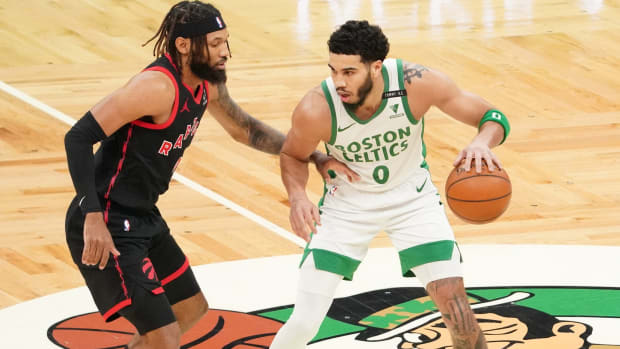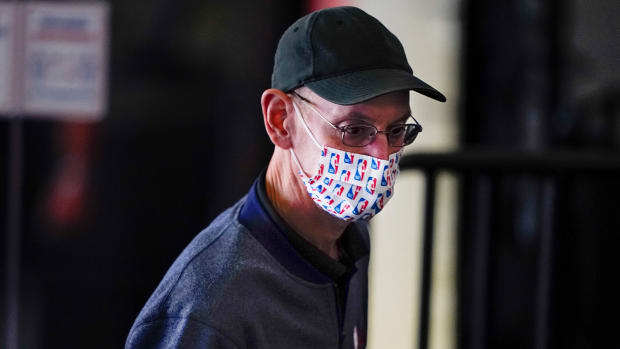The Celtics have been one of the NBA's most consistent teams in recent years, but this season has taken a lot of turns.
Welcome to the Morning Shootaround, where every weekday you’ll get a fresh, topical column from one of SI.com’s NBA writers: Howard Beck on Mondays, Chris Mannix on Tuesdays, Michael Pina on Wednesdays, Chris Herring on Thursdays and Rohan Nadkarni on Fridays.
BOSTON – The bottom officially fell out on February 24th, in Atlanta, when a winless road trip for the Celtics concluded with a lifeless performance against the Hawks. The offense was erratic (26% from three), the defense worse. Atlanta, then itself struggling to find an identity, connected on 53% of its shots—and a scorching 55% of its threes. Said a dejected Brad Stevens afterwards, “The next four games will tell us a lot about where we can go.”
Boston responded to Stevens challenge, winning all four. The stretch restored some of the confidence in the locker room, which had become infected with self doubt. It relieved the pressure on Stevens, whose job security had come under public scrutiny for the first time. It dimmed the spotlight on team president Danny Ainge, whose weekly radio appearances with The Sports Hub had Ainge playing the role of human heavy bag, absorbing criticism for the team’s lackluster play.
With the season set to resume this week, the Celtics—19-17 and in the thick of the conference playoff race—have reasons to be optimistic. They have two All-Stars in Jayson Tatum and Jaylen Brown. Jeff Teague’s play has picked up. Kemba Walker, a 2020 All-Star who has been inconsistent since his return from a knee injury, showed signs of life before the break. It was Walker who galvanized the locker room after the loss to Atlanta. His message: Nobody goes on break until we go on break.
There’s also reason to believe the fall could get worse. Depth is a significant issue. Tristan Thompson, an offseason signing, has been uneven. The defense, regularly ranked in the top-ten in the Stevens era, has eroded to the bottom half of the league. As close as Boston is to the top seed (five games) they are even closer to ninth (two). What has been one of the NBA’s most consistent teams in recent years has become one of its more unpredictable.
“Winning is what we are expected to do in Boston,” Ainge said in a recent radio interview. “We are expected to win, to put up championships, win playoff games, and that’s what we’re hoping to be able to do, still, this year.”

Hours before tip-off of his second All-Star game, Tatum fired up jumpers on a State Farm Arena practice floor, a pair of oversized headphones on his head. In his ears, the TNT crew, which was conducting a live interview. Shaquille O’Neal asked Tatum if he planned on making a run at All-Star MVP. Dwyane Wade quizzed Tatum about playing against Brown. Kenny Smith pivoted the conversation to the Celtics season, noting the “expectation level” on Boston and asking what the team had to do to regain ground.
Expectations have been Boston’s enemy this season. The Celtics have been one of the more consistent teams in the Eastern Conference the last four seasons, advancing to the conference finals in three of them, including in the NBA’s bubble last fall. Yet over the last three years Boston has experienced a significant talent drain. Al Horford left as a free agent in 2019. Kyrie Irving defected that same summer. Last November, Gordon Hayward opted out of the final year of his contract and signed a four-year, $120 million deal with Charlotte.
Boston’s gains didn’t match its losses. Walker replaced Irving, and he has been a better fit. But Horford, whose versatility was critical for the Celtics on both ends, left for nothing. And while Hayward’s three year run in Boston was snakebitten by injury, he averaged 17.5 points in his final season. “A lot of Boston’s problems are pretty easy to explain,” a rival executive told Sports Illustrated. “They lost a few good players. And they replaced them with guys who are not as good.”
Those players likely hold the key to the Celtics success this season. Boston knows what it will get from Tatum, an emerging superstar who is averaging a career-best 25 points per game this season. It has a now proven second star in Brown, whose outstanding play in the first half of the season—including a five-game stretch Tatum missed due to COVID-19—kept the Celtics afloat. Walker’s numbers are down across the board, but he showed flashes of the All-Star version of himself in the final four games—particularly from beyond the three-point line.
The Celtics will soon get a reliable piece back in Marcus Smart, who has been sidelined since early February with a calf injury. Boston is 9-9 since Smart went out, with opposing guards feasting without the All-Defensive Team fixture on the floor. But Smart is more than just a defensive stopper. He’s the team’s heart. His energy is infectious, an energy that Boston has sorely missed for the last month. Said a rival coach, “For every bad shot Smart takes, he makes two or three good plays. They miss that.”
The unknowns with Boston come from the back half of the rotation. Payton Pritchard has been a bright spot. The rookie, drafted 26th last fall, is averaging 7.7 points while connecting on 40% of his three’s. From there, though, there has been uncertainty. Robert Williams surged before the break, showing flashes of the shot blocking, rim running, hyper athletic big man the Celtics have been grooming the last three seasons. Grant Williams has been a mixed bag. Boston continues to believe in second year guard Romeo Langford, a 2019 lottery pick, but Langford has played just 32 games—and none this season as he recovers from wrist surgery.
The Celtics do have a potential ace in the hole in a $28.5 million trade exception acquired in the Hayward sign-and-trade. Internally, though, there are mixed feelings about using it before the March 25th trade deadline. The Celtics are high on Harrison Barnes, sources told Sports Illustrated, the Kings forward who could be moved by Sacramento. There’s interest in Jerami Grant, too, though the Pistons have not shown any urgency in offloading the 26-year old Grant, who is having a career season. The Celtics could also hold on to the exception and use it in a deal this offseason, before it expires.
The last option wouldn’t do anything to help the team this season, forcing a flawed roster to fend for itself in a top heavy conference. Brooklyn added Blake Griffin to its constellation of stars this week, Milwaukee recently welcomed Jrue Holiday back after an extended absence—while Giannis Antetokounmpo re-entered the MVP conversation—and the Sixers continue to show the kind of balanced attack that should give a team with two All-NBA superstars staying power.
These are the teams Boston will measure itself against in the next few months. And right now, the Celtics simply don’t measure up.
The NBA vs. the COVID-19 vaccine

It will likely be another couple of months before NBA players are eligible to receive the COVID-19 vaccine. And while Adam Silver, Doc Rivers and others have expressed confidence in the effectiveness of the vaccine, key players have remained noncommittal. LeBron James declined to answer if he would take the vaccine, calling it a family matter. Other players have expressed a desire to see more data before reaching a decision. Meanwhile, last month ESPN reported that players were uneasy about participating in any COVID-19 vaccine PSA, as retired players like Bill Russell have.
The NBA isn’t going to mandate that players get vaccinated. “I think ultimately these are personal decisions that players need to make, just like everyone in our communities need to make,” NBA commissioner Adam Silver said. “We see our role, together with the Players Association, providing them with the best possible information, and also encouraging them to seek out information on their own. They have personal physicians, others they may rely on.” Yet the league isn’t missing opportunities to incentivize taking it, either. Silver noted that new CDC guidelines say that vaccinated people do not need to quarantine because of a close contact with a COVID positive person. In Atlanta, Sixers stars Joel Embiid and Ben Simmons were forced to miss the All-Star game because of a close contact with a barber who tested positive back in Philadelphia.
Silver has expressed optimism that the majority of players will get vaccinated. Though that may be wishful thinking. The NBA was forced to postpone 31 games in the first half due to health and safety protocols, a number the league wants—needs—to be reduced over the final few months to successfully complete the season. Getting players vaccinated, eliminating the need to hold players out because of close contacts would be a significant first step.
“My hunch is that most players ultimately will choose to get vaccinated,” Silver said. “They have to make personal decisions at the end of the day -- and I take that very seriously, and I take concerns very seriously. But my sense is most [players] will, ultimately, decide it is in their interest to get vaccinated.”